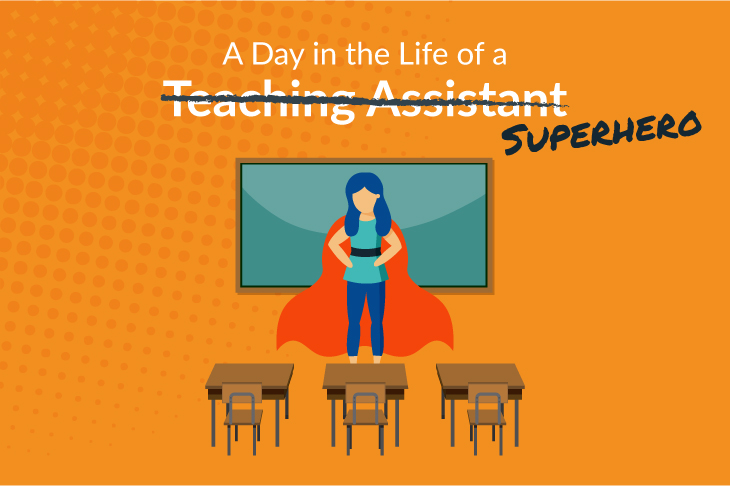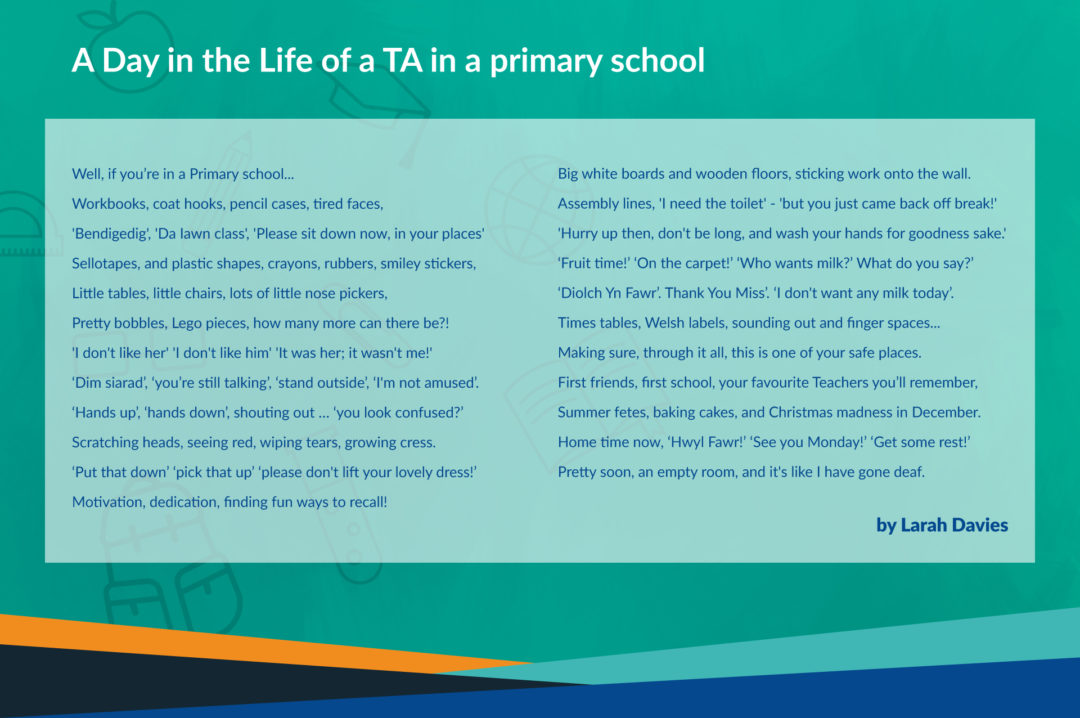A Day in the Life of a Teaching Assistant

On 16th September 2019, we celebrate National Teaching Assistants’ Day in the UK. Teaching, Learning or Classroom Assistants are vital resources in schools, and they are heavily relied upon by Teachers to help deliver planned lessons. In fact, a huge 96% of Headteachers agree that Teaching Assistants add value to their schools, meaning they are crucial in the education sector. Their contribution is recognised and valued widely, and we believe that our Teaching Assistants are superheroes in the classroom!
Read on to meet some of our superhero TAs and find out all about a day in the life of our Teaching Assistants…
What is a Teaching Assistant?
A Teaching Assistant (TA) is someone who supports Teachers and students with learning activities in schools. They may work one-to-one with individuals or with groups of students, with or without Special Educational Needs (SEN), supporting the Teacher to deliver their teaching plan effectively. Teaching Assistants have been linked with improved results and attainment, demonstrating just how important the role is for Teachers and students alike.
Many people choose to become TAs with New Directions Education for a variety of reasons. Allison realised that, after bringing up her daughter, she would love to be able to work with young children and it fit in well alongside her college studies. She says it is “such a rewarding job, because watching the progress and growth of young primary children or teenagers is an amazing feeling.”
On the other hand, Diane became a Teaching Assistant after taking early retirement and realising retirement wasn’t for her; Elizabeth decided to have a career change from customer services to Teaching Assistant; and Larah took on the role of TA to gain experience during her Teaching degree. She says, “it is a wonderful platform for those who want to work in Education and the TA role allows you to accumulate the experiences needed to learn and develop in the profession.”
So, what do Teaching Assistants do?
Our TAs are classroom superheroes in several school settings, from primary schools and secondary schools, to Additional Learning Needs (ALN) environments. Teaching Assistants need to be flexible and be able to adapt their approach to suit different age ranges and educational needs. They are creative, patient, great communicators, flexible, organised and strong team players, with a varied role to play in the school setting, supporting both students and Teachers in the process.

Diane has worked as a TA with New Directions Education for over 12 years. She loves the flexibility of the role and seeing students flourish. She says “there isn’t a typical day as every day is different. It also very much depends on the children’s needs and disabilities.”
The role is varied with many elements. For Donna, a day in work can involve “safeguarding, implementing the correct discipline procedures, liaising with outside sources and acting as a constant positive influence on others”, and Helen explains that it involves “helping everyone – from helping the children to learn whether it is by reading, writing, maths or even to put their shoes on, to helping the teachers with displays, sticking work in books and tidying up or helping the dinner ladies at lunchtime.”
Superheroes supporting students
A significant part of the Teaching Assistant role is to provide support for students inside and outside the classroom, enabling them to fully participate in school activities. This could range from helping children who require extra support to complete tasks, to listening to children read, or supervising a group during a classroom activity. Elizabeth finds that, although no two days are ever the same, “there are certain jobs that become routine, such as supporting the students in their work, trying to be a good role model and taking time to listen and engage with them.”
TAs are involved in assisting in the educational and social development of students under the direction and guidance of the Head Teacher, ALN Coordinator and Class Teachers. They often help to implement Individual Education Programmes for students and monitor their progress, playing a key role in education and learning. Allison currently works one-to-one with a student helping him to prepare for the day ahead and supporting him in lessons. She has spent a lot of time developing a trusted relationship with him over the past two years and her role has helped him gain confidence and self-esteem.
Teaching Assistants also support students with emotional or behavioural problems and help develop their social skills, including looking after children who are upset or struggling. This is crucial in improving the educational experience of the child, while also helping the Class Teacher to deliver their teaching plan to the rest of the class with as little disruption as possible. An aspect of the Teaching Assistant role that Donna finds challenging is managing difficult behaviour. Although it can be a challenge, she explains that “as soon as a plan has been put in place, watching a child or young person bettering themselves, and then watching them progress, is extremely rewarding.”
Superheroes supporting Teachers
Alongside helping students, Teaching Assistants support Class Teachers in many ways, working very closely together and acting as an extra pair of hands, eyes and ears in the classroom. Among their many responsibilities, they support Teachers with getting the classroom ready for lessons; helping to manage class behaviour throughout the day; maintaining student records; and clearing away or tidying up the classroom after activities. Teaching Assistants help to take care of some of the administrative duties in the classroom, freeing up the Teacher to focus on the students’ educational needs. For Larah, “working within a team of people who ultimately want the best for the students, and one another is a joy and it also grants the opportunity to create valuable and beneficial relationships with others in this line of work” which is extremely beneficial for those who wish to progress into teaching in the future.
Alongside in-class assistance, TAs also provide support on school trips and supervision at lunchtime and during sporting activities. Without this crucial guidance and support, Teachers would be unable to deliver their educational plans in environments outside of the classroom. Therefore, Teaching Assistants amplify the efforts of the Teacher and improve the learning experience of the students too.
TAs are part of a wider team of school staff, playing a crucial role in delivering high-quality education to children and young people. Allison states that “working in this team gives you the opportunity to be able to ask for help during the more changing times, or to give that support to others in a similar situation.”

Thank you to our superhero Teaching Assistants
At New Directions Education, we are proud of the hard work of our TAs in schools every day and grateful for their essential contribution to the work of Teachers and the success of students too. Let’s hear it for our classroom superheroes!
Register with New Directions Education today to join our growing team of Teaching Assistants superheroes. For further inspiration, check out our superheroes’ top tips for anyone looking at a career as a Teaching Assistant:
Diane: “Go into it with the aim to learn as much as you can and to improve every day.”
Allison: “Get to know your team and line managers and familiarise yourself with policies, health and safety and safeguarding. Also try to get to know the children, speak to them on their level and get involved in extra-curricular activities to build stronger relationships and trust.
Some schools don’t include agency staff on the Inset days, these can be so beneficial especially during the first days of a new school year so if you’re able to, take advantage of this.”
Elizabeth: “I would advise anyone to stay flexible, stay interested, take advice, but most of all, enjoy the students, because they are all so individual.”
Donna: “Have a lot of patience. All children and young people have different needs, so see beyond the problem and look for the source that caused it. Don’t just assume that challenging behaviour is just ‘naughtiness’ as there is always a source that gives reason behind their behaviour. Find the source and then by dealing with that, you can unlock the child/young person at their best.”
Helen: “Learn the children’s names, give them a chance to speak and accept there will be some bad days (but the majority are usually good!)”
‹ Previous articleNext article ›Larah: “Get stuck in! So many schools tell me they wish more Teaching Assistants/LSA’s would take initiative and just trust in themselves. We all make mistakes so don’t be afraid to make them, you are NOT the only one – that’s how we learn and grow. Work hard, be conscientious, but don’t take yourself too seriously. Be silly! Don’t worry about what anybody else is thinking, it’s about the children, not you, and not what your peers have to say about you. Have fun with the students, make them belly laugh. Maybe this is the only time an adult is silly with them! Be observant – notice the little things, like when it looks as though someone needs that extra help, step in, prioritise them. If a child is quieter than usual, ask questions. It may not always seem like it, but what you do is so important, so do it the best you can.”